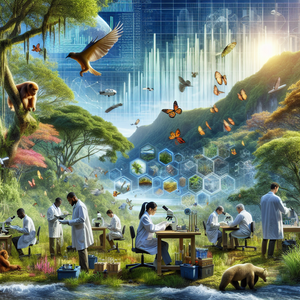The Future of Nutritional Science: Careers in Tech

The convergence of technology and nutritional science marks a pivotal moment in how we understand and manage our diets. The proliferation of mobile health applications, wearable devices, and data analytics is reshaping the landscape, making nutrition more accessible and personalized. This digital transformation has created a demand for professionals who can effectively bridge the gap between nutritional science and technological innovation, leading to the emergence of unique career paths.
Emerging Roles in Nutritional Technology
1. Data Analysts in Nutrition: The explosion of data generated by health apps and wearable technologies has created a crucial need for data analysts. These professionals are tasked with interpreting complex dietary data, identifying trends, and providing actionable insights. For example, a data analyst might work with a health app to analyze user behavior and dietary patterns, ultimately informing personalized nutrition plans. Their contributions extend beyond individual health management, supporting broader research efforts in nutritional epidemiology that can shape public health initiatives. 2. App Developers: As consumers increasingly seek personalized dietary guidance, app developers are emerging as key players in the nutritional technology landscape. These professionals design user-friendly applications that offer meal planning, recipe suggestions, and nutritional education tailored to users' specific health goals. For instance, an app could provide users with customized meal plans based on their dietary restrictions and preferences, making nutrition more engaging and accessible. Successful app development requires a unique blend of technical skills and a deep understanding of nutritional science. 3. Wearable Tech Engineers: The rise of wearable devices, such as smartwatches and fitness trackers, has revolutionized how we monitor health and nutrition. Engineers in this domain are focused on creating innovative technologies that can measure various health indicators, including glucose levels, heart rate, and caloric expenditure, in real-time. By integrating nutritional data with biometric information, these devices empower users to make informed dietary choices. For instance, a smartwatch that tracks caloric intake alongside physical activity can provide users with real-time feedback on their dietary habits.
Skills Required for Success
To excel in these emerging roles, individuals interested in the intersection of technology and nutritional science must cultivate a diverse skill set: - Technical Proficiency: Familiarity with programming languages, data analysis tools, and app development frameworks is essential for those looking to enter the tech side of nutrition. Skills in machine learning and artificial intelligence can also enhance the ability to analyze large datasets effectively. - Understanding of Nutritional Science: A strong foundation in nutritional principles is crucial for professionals in this field. They must be capable of interpreting complex data and translating it into actionable dietary advice that resonates with consumers. - Communication Skills: The ability to convey complex nutritional information in a clear and engaging manner is vital, especially for app developers and data analysts who interact directly with consumers. Effective communication helps demystify nutritional science and empowers individuals to make informed choices.
The Impact on Public Health
The integration of technology into nutritional science holds transformative potential for public health. By equipping consumers with the tools they need to make informed dietary choices, technology can lead to improved health outcomes on a population level. For instance, personalized nutrition apps can assist individuals with specific health conditions, such as diabetes or obesity, in managing their diets more effectively. Moreover, the insights generated through data analytics can inform public health campaigns, targeting populations that may benefit from tailored nutritional interventions, thereby improving overall community health.
As we look to the future, the intersection of nutritional science and technology presents exciting opportunities for career growth and innovation. Professionals in this field have the potential to make significant contributions to public health and individual wellness through data analysis, app development, and wearable technology. By embracing the possibilities that technological advancements offer, individuals passionate about food, health, and technology can help shape a healthier future.
Nutritional Data Scientist
Core Responsibilities
Analyze and interpret large datasets related to dietary habits and health outcomes to derive actionable insights.
Collaborate with nutritionists and healthcare professionals to develop evidence-based nutritional guidelines.
Required Skills
Proficiency in statistical analysis tools (e.g., R, Python, SQL) and machine learning techniques.
Strong understanding of nutritional science and its application in public health.
Common Employers
Research institutions
health tech companies
public health organizations
Health App User Experience (UX) Designer
Core Responsibilities
Design intuitive user interfaces and experiences for health and nutrition applications that enhance user engagement.
Conduct user research and usability testing to optimize app features based on user feedback.
Required Skills
Expertise in design software (e.g., Sketch, Adobe XD) and a solid understanding of human-computer interaction principles.
Knowledge of nutritional science to ensure that the app effectively meets users' dietary needs.
Common Employers
Mobile health startups
established tech companies focused on health
wellness app developers
Nutrition Technology Consultant
Core Responsibilities
Advise healthcare providers and wellness organizations on the integration of technology in nutrition-related services.
Assess and recommend software, apps, or devices that can enhance patient care and dietary management.
Required Skills
Strong background in both nutritional science and technology, with experience in project management.
Excellent communication skills for effectively conveying technical concepts to non-technical stakeholders.
Common Employers
Consulting firms
health tech companies
non-profit health organizations
Wearable Device Product Manager
Core Responsibilities
Oversee the development and launch of wearable devices that track nutritional and health metrics.
Collaborate with engineering, marketing, and design teams to ensure product alignment with market needs and user expectations.
Required Skills
Experience in product management, preferably within the health or tech sectors, along with a solid understanding of wearable technology.
Knowledge of nutritional science to inform product features and user engagement strategies.
Common Employers
Consumer electronics companies
fitness technology firms
health-focused startups
Personalized Nutrition Coach with Tech Focus
Core Responsibilities
Provide individualized dietary advice based on data collected through health apps and wearable devices.
Use technology to track client progress and adjust nutrition plans in real-time based on user data and feedback.
Required Skills
Certification in nutrition or dietetics, along with experience using technology for health monitoring.
Strong interpersonal skills to build relationships with clients and motivate them towards their health goals.
Common Employers
Wellness centers
health coaching platforms
telehealth companies


